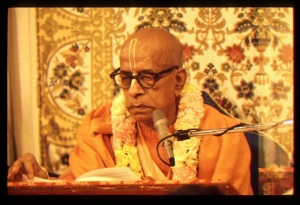SB 7.13.21: Difference between revisions
m (1 revision(s)) |
(Vanibot #0018 edit: make synonym terms in Sanskrit italic in SB - Vanisource) |
||
| Line 1: | Line 1: | ||
{{info | {{info | ||
|speaker= | |speaker=saintly brāhmaṇa | ||
|listener= | |listener=Prahlāda Mahārāja | ||
}} | }} | ||
[[Category:Srimad-Bhagavatam - Canto 07 Chapter 13]] | |||
[[Category:Bhagavatam Verses Spoken by the Saintly Brahmana - Vanisource|071321]] | |||
<div style="float:left">'''[[Srimad-Bhagavatam]] - [[SB 7|Seventh Canto]] - [[SB 7.13: The Behavior of a Perfect Person|Chapter 13: The Behavior of a Perfect Person]]'''</div> | |||
<div style="float:right">[[File:Go-previous.png|link=SB 7.13.20]] '''[[SB 7.13.20]] - [[SB 7.13.22]]''' [[File:Go-next.png|link=SB 7.13.22]]</div> | |||
{{RandomImage}} | |||
==== TEXT 21 ==== | ==== TEXT 21 ==== | ||
<div | <div class="verse"> | ||
śrī-brāhmaṇa uvāca | :śrī-brāhmaṇa uvāca | ||
vededam asura-śreṣṭha | :vededam asura-śreṣṭha | ||
bhavān nanv ārya-sammataḥ | :bhavān nanv ārya-sammataḥ | ||
īhoparamayor nṟṇāṁ | :īhoparamayor nṟṇāṁ | ||
padāny adhyātma-cakṣuṣā | :padāny adhyātma-cakṣuṣā | ||
</div> | </div> | ||
| Line 18: | Line 23: | ||
==== SYNONYMS ==== | ==== SYNONYMS ==== | ||
<div | <div class="synonyms"> | ||
śrī-brāhmaṇaḥ | ''śrī-brāhmaṇaḥ uvāca''—the brāhmaṇa replied; ''veda''—know very well; ''idam''—all these things; ''asura-śreṣṭha''—O best of the asuras; ''bhavān''—you; ''nanu''—indeed; ''ārya-sammataḥ''—whose activities are approved by civilized men; ''īhā''—of inclination; ''uparamayoḥ''—of decreasing; ''nṟṇām''—of the people in general; ''padāni''—different stages; ''adhyātma-cakṣuṣā''—by transcendental eyes. | ||
</div> | </div> | ||
| Line 25: | Line 30: | ||
==== TRANSLATION ==== | ==== TRANSLATION ==== | ||
<div | <div class="translation"> | ||
The saintly brāhmaṇa said: O best of the asuras, Prahlāda Mahārāja, who are recognized by advanced and civilized men, you are aware of the different stages of life because of your inherent transcendental eyes, with which you can see a man's character and thus know clearly the results of acceptance and rejection of things as they are. | The saintly brāhmaṇa said: O best of the asuras, Prahlāda Mahārāja, who are recognized by advanced and civilized men, you are aware of the different stages of life because of your inherent transcendental eyes, with which you can see a man's character and thus know clearly the results of acceptance and rejection of things as they are. | ||
</div> | </div> | ||
| Line 32: | Line 37: | ||
==== PURPORT ==== | ==== PURPORT ==== | ||
<div | <div class="purport"> | ||
A pure devotee like Prahlāda Mahārāja can understand the minds of others because of his pure vision in devotional service. A devotee like Prahlāda Mahārāja can study another man's character without difficulty. | A pure devotee like Prahlāda Mahārāja can understand the minds of others because of his pure vision in devotional service. A devotee like Prahlāda Mahārāja can study another man's character without difficulty. | ||
</div> | </div> | ||
__NOTOC__ | |||
<div style="float:right; clear:both;">[[File:Go-previous.png|link=SB 7.13.20]] '''[[SB 7.13.20]] - [[SB 7.13.22]]''' [[File:Go-next.png|link=SB 7.13.22]]</div> | |||
__NOTOC__ | |||
__NOEDITSECTION__ | |||
Revision as of 05:46, 1 December 2017

A.C. Bhaktivedanta Swami Prabhupada
TEXT 21
- śrī-brāhmaṇa uvāca
- vededam asura-śreṣṭha
- bhavān nanv ārya-sammataḥ
- īhoparamayor nṟṇāṁ
- padāny adhyātma-cakṣuṣā
SYNONYMS
śrī-brāhmaṇaḥ uvāca—the brāhmaṇa replied; veda—know very well; idam—all these things; asura-śreṣṭha—O best of the asuras; bhavān—you; nanu—indeed; ārya-sammataḥ—whose activities are approved by civilized men; īhā—of inclination; uparamayoḥ—of decreasing; nṟṇām—of the people in general; padāni—different stages; adhyātma-cakṣuṣā—by transcendental eyes.
TRANSLATION
The saintly brāhmaṇa said: O best of the asuras, Prahlāda Mahārāja, who are recognized by advanced and civilized men, you are aware of the different stages of life because of your inherent transcendental eyes, with which you can see a man's character and thus know clearly the results of acceptance and rejection of things as they are.
PURPORT
A pure devotee like Prahlāda Mahārāja can understand the minds of others because of his pure vision in devotional service. A devotee like Prahlāda Mahārāja can study another man's character without difficulty.